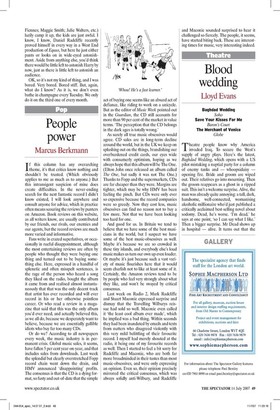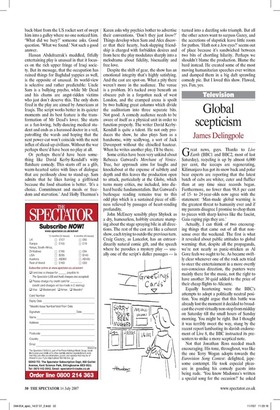Blood wedding
Lloyd Evans Baghdad Wedding Soho Save Your Kisses For Me Baron's Court The Merchant of Venice Globe Theatre people know why America I invaded Iraq. To secure the West's supply of angry plays. Here's the latest, Baghdad Wedding, which opens with a US pilot mistaking a nuptial party for a column of enemy tanks and — whoopsidaisy — opening fire. Bride and groom are wiped out. Their relatives go into mourning. Then the groom reappears as a ghost in a ripped suit. This isn't a welcome surprise. Alive, the man was already quite annoying: a tall, dark, handsome, well-connected, womanising alcoholic millionaire who'd just published a critically acclaimed best-selling novel about sodomy. Dead, he's worse. 'I'm dead,' he says at one point, 'so I can say what I like.' Then a bigger surprise. Mr Dead shows up in hospital — alive. It turns out that the back-blast from the US rocket sort of swept him into a gulley where no one noticed him 'What did we bury?' someone asks. Good question. 'What we found.' Not such a good answer.
Hassan Abdulrazzak's muddled, fitfully entertaining play is unusual in that it focuses on the rich upper fringe of Iraqi society. But its message, that the occupation has ruined things for Baghdad yuppies as well, is the opposite of unusual. Its world-view is selective and rather predictable: Uncle Sam is a bullying psycho, while Mr Dead and his chums are angst-ridden victims who just don't deserve this. The only shots fired in the play are aimed by Americans at Iraqis. The script works better in its quieter moments and its best feature is the transformation of Mr Dead's lover. She starts as a fun-loving, belly-dancing medical student and ends as a harassed doctor in a veil, patrolling the wards and hoping that the next power-cut won't coincide with the next influx of sliced-up civilians. Without the war perhaps there'd have been no play at all.
Or perhaps there'd have been something like David Kerby-Kendall's witty flatshare comedy. This starts off as a glib, warm-hearted satire with lines of dialogue that are perilously close to stand-up. Sam admits that he likes having a girlfriend because the food situation is better. 'It's a choice. Commitment and meals or freedom and starvation.' And Holly Thurman's Karen asks why psychics bother to advertise their conventions. 'Don't they just know?' Things develop when Sam and Alex discover that their hearty, back-slapping friendship is charged with forbidden desires and from here the play modulates sharply into a melodrama about fidelity, bisexuality and free love.
Despite the shift of gear, the show has an emotional integrity that's highly satisfying. And the cast are spot-on. What a pity there weren't more in the audience. The venue is a problem. It's tucked away beneath an obscure pub in a forgotten neck of west London, and the cramped arena is spoilt by two hulking great columns which divide the auditorium into three separate bits. Not good. A comedy audience needs to be aware of itself as a physical unit in order to function properly. The writer David KerbyKendall is quite a talent. He not only produces the show, he also plays Sam as a handsome, witty scallywag, a sort of Jack Davenport without the chiselled hauteur. When he writes another play, I'll be there.
Some critics have been very unkind about Rebecca Gatward's Merchant of Venice. True, her approach aims for laughs and knockabout at the expense of subtlety and depth and this leaves the production open to attack, particularly at the Globe, which turns many critics, me included, into diehard bardic fundamentalists. But Gatward's burlesque reading remains true to this odd play which is a sustained piece of silliness relieved by passages of heart-rending profundity.
John McEnery sensibly plays Shylock as a dry, humourless, hobbity creature stumping about the stage spraying bile in all directions. The rest of the cast are like a cabaret show, each trying to outdo the previous turn. Craig Gazey, as Lancelot, has an extraordinarily natural comic gift, and the speech where he parodies a mystery play — usually one of the script's duller passages — is turned into a dazzling solo triumph. But all the other actors want to surpass Gazey, and the accretions of slapstick leave little room for pathos. `Hath not a Jew eyes?' seems out of place because it's sandwiched between two bits of chortling hilarity. Perhaps we shouldn't blame the production. Blame the bard instead. He created some of the most moving humanitarian speeches ever written and dumped them in a big daft sprawling comedy pie. But I loved this show. Flawed, yes. Fun, yes.


















































 Previous page
Previous page